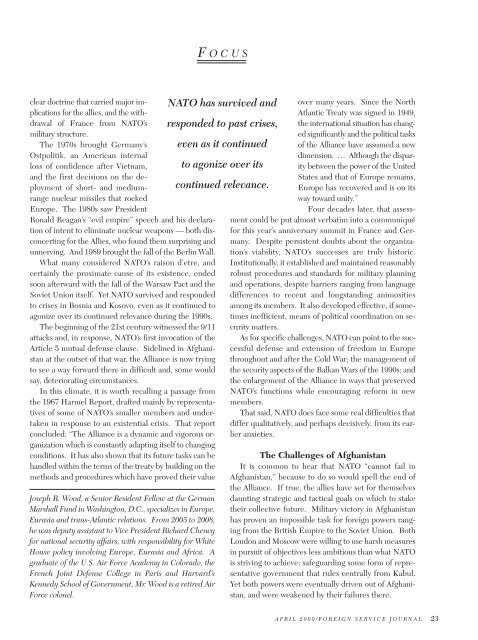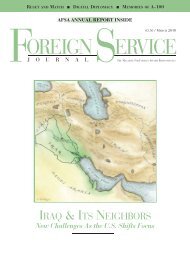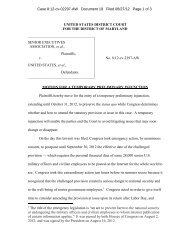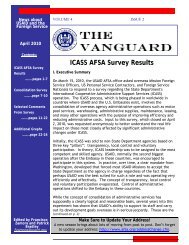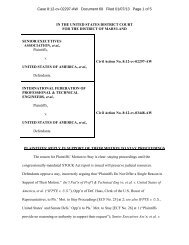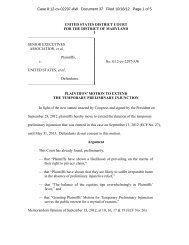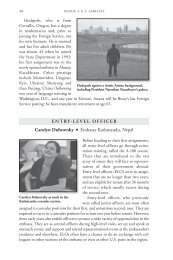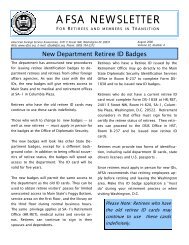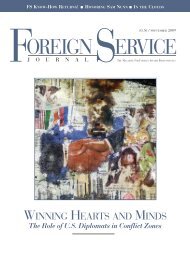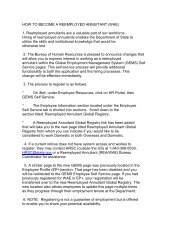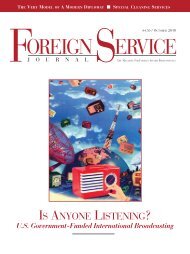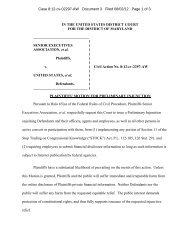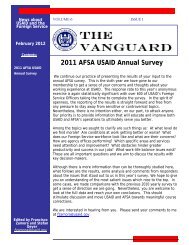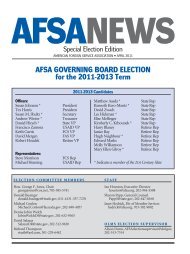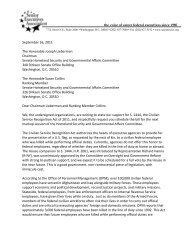F OCUS - American Foreign Service Association
F OCUS - American Foreign Service Association
F OCUS - American Foreign Service Association
Create successful ePaper yourself
Turn your PDF publications into a flip-book with our unique Google optimized e-Paper software.
F O C U S<br />
clear doctrine that carried major implications<br />
for the allies, and the withdrawal<br />
of France from NATO’s<br />
military structure.<br />
The 1970s brought Germany’s<br />
Ostpolitik, an <strong>American</strong> internal<br />
loss of confidence after Vietnam,<br />
and the first decisions on the deployment<br />
of short- and mediumrange<br />
nuclear missiles that rocked<br />
Europe. The 1980s saw President<br />
Ronald Reagan’s “evil empire” speech and his declaration<br />
of intent to eliminate nuclear weapons — both disconcerting<br />
for the Allies, who found them surprising and<br />
unnerving. And 1989 brought the fall of the Berlin Wall.<br />
What many considered NATO’s raison d’etre, and<br />
certainly the proximate cause of its existence, ended<br />
soon afterward with the fall of the Warsaw Pact and the<br />
Soviet Union itself. Yet NATO survived and responded<br />
to crises in Bosnia and Kosovo, even as it continued to<br />
agonize over its continued relevance during the 1990s.<br />
The beginning of the 21st century witnessed the 9/11<br />
attacks and, in response, NATO’s first invocation of the<br />
Article 5 mutual defense clause. Sidelined in Afghanistan<br />
at the outset of that war, the Alliance is now trying<br />
to see a way forward there in difficult and, some would<br />
say, deteriorating circumstances.<br />
In this climate, it is worth recalling a passage from<br />
the 1967 Harmel Report, drafted mainly by representatives<br />
of some of NATO’s smaller members and undertaken<br />
in response to an existential crisis. That report<br />
concluded: “The Alliance is a dynamic and vigorous organization<br />
which is constantly adapting itself to changing<br />
conditions. It has also shown that its future tasks can be<br />
handled within the terms of the treaty by building on the<br />
methods and procedures which have proved their value<br />
Joseph R. Wood, a Senior Resident Fellow at the German<br />
Marshall Fund in Washington, D.C., specializes in Europe,<br />
Eurasia and trans-Atlantic relations. From 2005 to 2008,<br />
he was deputy assistant to Vice President Richard Cheney<br />
for national security affairs, with responsibility for White<br />
House policy involving Europe, Eurasia and Africa. A<br />
graduate of the U.S. Air Force Academy in Colorado, the<br />
French Joint Defense College in Paris and Harvard’s<br />
Kennedy School of Government, Mr. Wood is a retired Air<br />
Force colonel.<br />
NATO has survived and<br />
responded to past crises,<br />
even as it continued<br />
to agonize over its<br />
continued relevance.<br />
over many years. Since the North<br />
Atlantic Treaty was signed in 1949,<br />
the international situation has changed<br />
significantly and the political tasks<br />
of the Alliance have assumed a new<br />
dimension. … Although the disparity<br />
between the power of the United<br />
States and that of Europe remains,<br />
Europe has recovered and is on its<br />
way toward unity.”<br />
Four decades later, that assessment<br />
could be put almost verbatim into a communiqué<br />
for this year’s anniversary summit in France and Germany.<br />
Despite persistent doubts about the organization’s<br />
viability, NATO’s successes are truly historic.<br />
Institutionally, it established and maintained reasonably<br />
robust procedures and standards for military planning<br />
and operations, despite barriers ranging from language<br />
differences to recent and longstanding animosities<br />
among its members. It also developed effective, if sometimes<br />
inefficient, means of political coordination on security<br />
matters.<br />
As for specific challenges, NATO can point to the successful<br />
defense and extension of freedom in Europe<br />
throughout and after the Cold War; the management of<br />
the security aspects of the Balkan Wars of the 1990s; and<br />
the enlargement of the Alliance in ways that preserved<br />
NATO’s functions while encouraging reform in new<br />
members.<br />
That said, NATO does face some real difficulties that<br />
differ qualitatively, and perhaps decisively, from its earlier<br />
anxieties.<br />
The Challenges of Afghanistan<br />
It is common to hear that NATO “cannot fail in<br />
Afghanistan,” because to do so would spell the end of<br />
the Alliance. If true, the allies have set for themselves<br />
daunting strategic and tactical goals on which to stake<br />
their collective future. Military victory in Afghanistan<br />
has proven an impossible task for foreign powers ranging<br />
from the British Empire to the Soviet Union. Both<br />
London and Moscow were willing to use harsh measures<br />
in pursuit of objectives less ambitious than what NATO<br />
is striving to achieve: safeguarding some form of representative<br />
government that rules centrally from Kabul.<br />
Yet both powers were eventually driven out of Afghanistan,<br />
and were weakened by their failures there.<br />
A P R I L 2 0 0 9 / F O R E I G N S E R V I C E J O U R N A L 23


